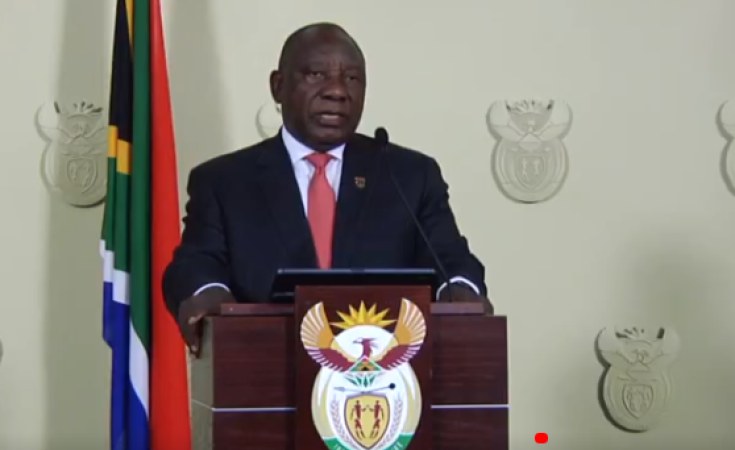Cape Town — South Africa's President Cyril Ramphosa announced "urgent and drastic measures" Sunday night – including banning gatherings of more than 100 people, closing schools and imposing extensive travel bans – to curb the spread of the corona virus.
Using a law known as the Disaster Management Act, he declared a "national state of disaster" enabling the government to have what he called "an integrated and coordinated disaster management mechanism that will focus on preventing and reducing the outbreak of this virus."
The key elements of his announcement, drawn from his statement and Twitter feed:
Ban on public gatherings
Gatherings of more than 100 people will be prohibited. Mass celebrations of upcoming national days such as Human Rights Day and other large government events will be cancelled.
Where small gatherings are unavoidable, organisers will need to put in place stringent measures of prevention and control.
School closures
Schools will be closed from Wednesday, 18 March, and will remain closed until after the Easter weekend. To compensate, the mid-year school holidays will be shortened by a week.
Travel bans
We are imposing a travel ban on foreign nationals from high-risk countries such as Italy, Iran, South Korea, Spain, Germany, the United States, the United Kingdom and China as from 18 March 2020.
We have cancelled visas to visitors from those countries from today and previously granted visas are hereby revoked. Any foreign national who has visited high-risk countries in the past 20 days will be denied a visa.
All travellers who have entered South Africa from high-risk countries since mid-February will be required to present themselves for testing.
South African citizens are advised to refrain from all forms of travel to or through the European Union, United States, United Kingdom and other identified high-risk countries such as China, Iran and South Korea. This is effective immediately.
South African citizens returning from high-risk countries will be subjected to testing and self-isolation or quarantine on return to South Africa.
Travellers from medium-risk countries – such as Portugal, Hong Kong and Singapore – will be required to undergo high intensity screening.
Effective immediately, all non-essential travel for all spheres of government outside of the Republic is prohibited We further discourage all non-essential domestic travel, particularly by air, rail, taxis and bus.
Of... 53 land ports (border entry points), 35 will be shut down with effect from Monday 16 March.
We will strengthen surveillance, screening and testing measures at OR Tambo (Johannesburg), Cape Town and King Shaka (Durban) International Airports.
This is will enable us to have an integrated and coordinated disaster management mechanism that will focus on preventing and reducing the outbreak of this virus. We will also be able to set up emergency, rapid and effective response systems.
Other steps
[W]e are calling on everyone to:
• Wash their hands frequently with soap and water or hand sanitisers for at least 20 seconds;
• Cover their nose and mouth when coughing and sneezing with tissue or flexed elbow;
• Avoid close contact with anyone with cold or flu-like symptoms.
In essence, we are calling for a change of behaviour amongst all South Africans.
We must minimise physical contact with other people, and, encourage the elbow greeting rather than shaking hands.
[Interviewed by Newzroom Africa, an independent South African TV channel, after Ramaphosa's statement, Anglican Archbishop Thabo Makgoba, aligned himself with experts who discourage an "elbow greeting" - urging people to avoid contact altogether and to greet one another by waving their hands.] (AllAfrica Editors' note.)
Government is working closely with colleges, universities and other public facilities such as Parliament, prisons, police stations and military installations to intensify hygiene control.
We call on all businesses including mining, retail, banking, farming to ensure that they take all necessary measures to intensify hygiene control.
We also call on the management of malls, entertainment centres and other places frequented by large numbers of people to bolster their hygiene control.
Coronavirus has potential to bring nation together
Ramaphosa also urged everyone to keep their distance from anyone coughing or sneezing.
[Coronavirus experts are warning that people who are infected but do not show symptoms of the virus - including young people who may never have symptoms - may be among those most efficient at spreading the virus. Therefore, keeping a physical distance from other people - whatever their symptoms or lack of them - is one of the surest ways to slow rates of infections.] (AllAfrica Editors' note)
The South African president ended his statement by exhorting the country to overcome its divisions and stand together:
"While we are facing a medical emergency far graver than we have experienced in recent times, we are not helpless. We have the knowledge, the means and the resources to fight this disease. If we act swiftly, with purpose and collectively, we can limit the effects of the coronavirus on our people and our country.
"Although we may be limiting physical contact, this epidemic has the potential to bring us closer together. We are responding as a united nation to a common threat. This national emergency demands cooperation, collaboration and common action. More than that, it requires solidarity, understanding and compassion."


